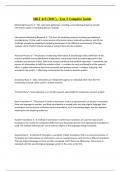MKT 415 (MSU) - Test 2 Complete Guide
Marketing Research ✔️The systematic gathering, recording, and analyzing of data to provide
information useful in marketing decision making.
International Marketing Research ✔️The form of marketing research involving two additional
considerations: (1) the need to communicate information across national boundaries, and (2) the
challenge of applying established marketing techniques in the different environments of foreign
markets, some of which may be strange or vexing milieus for the marketer.
Research Process ✔️The process of obtaining information; it should begin with a definition of the
research problem and establishment of objectives, and proceed with an orderly approach to the
collection and analysis of data. Define the research problem and establish objectives -> determine the
sources of information to fulfill the research effort -> consider the costs and benefits of the research
effort -> gather the relevant data from secondary and primary sources -> analyze, interpret, and
summarize the results -> effectively communicate the results to decision makers
Secondary Data ✔️Data collected by an independent agency or individual other than the firm
conducting research; often useful in market research.
Primary Data ✔️Data collected, as in market research, specifically for a particular research project.
Back Translation ✔️The process in which a document, such as a questionnaire, or phrase is translated
from one language to another, and then translated by a second party into the original language. Back
translations can be used to verify that the first translation, as of a marketing slogan, has the intended
meaning for the targeting audiences.
Parallel Translation ✔️A method of translation in which two translators are used to make a back
translation; the results are compared, differences are discussed, and the most appropriate translation is
used. The method addresses the use of common idioms in the languages being translated.
Decentering ✔️A method of translation, a variation of back translation, that is a successive process of
translation and retranslation of a document, such as a questionnaire, each time by a different translator.
The two original-language versions are then compared, and if there are differences, the process is
repeated until the second original-language version is the same as the first.
,Multicultural Research ✔️Inquiry, analysis, and study of more than two countries and cultures, and
takes into account differences in language, economic structure, social structure, behavior, and attitude
patterns. Different methods of research may have varying reliability in different countries.
Expert Opinion ✔️A method of market estimation in which experts are polled for their opinions about
market size and growth rates; used particularly in foreign countries that are new to the marketer.
Triangulation ✔️A term borrowed from naval charting meaning using at least three different measures
of the same concept to verify the accuracy of any one method. For example, regarding forecast of
demand, separate opinions of experts, sales representatives, and quantitative economic analysis might
be compared.
Analogy ✔️A method of market estimation that assumes the demand for a product developed in much
the same way in all countries as comparable economic development occurs in each country.
Quality ✔️The essential character of something, such as a good or service; defined in two dimensions:
market-perceived quality and performance quality. Consumer perception of a product's quality often
has more to do with market-perceived quality than performance quality.
Product Homologation ✔️A term used to describe changes in a product that are mandated by local
standards for product and service quality.
A local organization imposes new standards and firms have to adapt, change in product to meet
standards or because you have to change something to fit.
Green Marketing ✔️Consideration and concern for the environmental consequences of product
formulation, marketing, manufacturing, and packaging.
Innovation ✔️An idea perceived as new by a group of people; when applied to a product, and
innovation may be something completely new or something that is perceived as new in a given country
or culture.
, Diffusion ✔️The adoption or spread of products across markets by increasing numbers of consumers.
Product Component Model ✔️A tool for characterizing how a tool may be adapted to a new market by
separating the products many dimensions into three components: support services, packaging, and core
components.
Global Brand ✔️The worldwide use of a name, term, sign, symbol (visual or auditory), design, or a
combination thereof to identify goods or services of a seller and to differentiate them from those of
competitors.
Derived Demand ✔️Demand that is dependent on another source; it can be fundamental to the success
of efforts to sell capital equipment and big-ticket industrial services. For example, the demand for
commercial airliners is derived from the demand for air travel.
Price-Quality Relationship ✔️The balance between a product's price and how well the product
performs.
ISO 9000s ✔️A series of internatonal industrial standards (ISO 9000-9004) originally designed by the
International Organization for Standardization to meet the need for product quality assurances in
purchasing agreements.
Client Following ✔️Companies, often providers of services, that follow companies that first moved into
a foreign market; for example, an American insurance company setting up in Mexico to serve a U.S. auto
company that had previously opened a factory there.
When you have a client that decides to go international and you decide to follow them.
Relationship Marketing ✔️The aspect of marketing products that depends on long-term associations
with customers; an important factor in business-to-business contexts and especially important in most
international markets, where culture dictates strong ties between people and companies.




